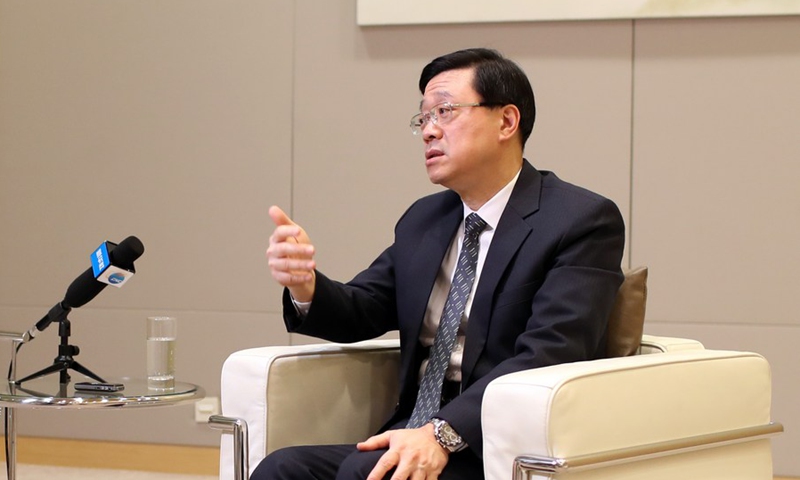
Secretary for Security of the HKSAR government John Lee Ka-chiu speaks during an interview with Xinhua in south China's Hong Kong on Jan. 28, 2021.Photo:Xinhua
Fugitives who have fled overseas under charges related to national security will be pursued for life under the national security law for Hong Kong, John Lee, the Secretary for Security of the Hong Kong Special Administrative Region, warned on Wednesday.
In a Cable TV interview, Lee said that the fugitives, who are currently “protected” by foreign governments, will become disposable when they are of no political value, and will be pursued for the rest of their lives by the Hong Kong police.
“International relations are changing every moment,” Lee said. “But we [Hong Kong authorities] hold them criminally responsible for life for sure.”
Since the national security law for Hong Kong came into effect in June 2020, a number of high-profile secessionists in the city’s yearlong social turmoil, including former lawmakers Nathan Law, Baggio Leung, Ted Hui and Dennis Kwok, have fled to Western countries.
Some of the absconding secessionists including Hui and Law were first well received in these countries, but
quickly lost favor as they lost political value.
Hui relocated from the UK to Australia only one month after fleeing Hong Kong. Hong Kong political commentators believed that his relocation shows that his life in the UK was not going well.
“Traveling around the world stigmatizing Hong Kong will make his future political struggle in Australia unpleasant as well,” said Chan Wan-Sang, a political commentator and former Hong Kong lawmaker.
“No one cares about the absconding secessionists’ overseas propaganda,” Eunice Yung said on Law’s fleeing in March.
This proves that they are only pawns for the West to hold China in check, Li Xiaobing, an expert on Hong Kong, Macao and Taiwan studies at Nankai University in Tianjin, told the Global Times. "Very soon, they will be abandoned by both Western politicians and their hometown Hong Kong. Their political ambitions will never be realized."
Lee's statement is more than just an expression of confidence. The Hong Kong government, police and courts can work together to take various measures to recapture absconders and prevent more incidents like this from happening, Kennedy Wong Ying-ho, solicitor of the Supreme Court of Hong Kong, told the Global Times on Thursday.
“Hong Kong is a member of Interpol, and member countries or regions have the obligation to provide mutual legal assistance to each other in criminal matters,” Wong said, “The Hong Kong police can make an offer of arrest to Interpol. If the absconder is on bail, then the court can also issue an international warrant.”
Wong noted that although some countries have suspended their agreements on the surrender of fugitive offenders with Hong Kong, mutual criminal assistance has not ceased, and there is no suspension in the area of evidence collection.
Under the law, the police can request that banks freeze the assets of people involved in crimes such as money laundering or endangering national security. This is also an important tool to induce fugitives to return to Hong Kong, Wong said.
In December, the Hong Kong police froze Hui’s bank accounts, which involves about HK$850,000 ($109,700), on suspicion of embezzling crowdfunding money from his relatives’ accounts.
In the past, the courts have been more lenient on the size of bail, leading many people to jump bail and abscond after trial. The Department of Justice should call on the courts to tighten bail approvals in the future and to recall the travel documents of those suspected of major crimes, Wong said.
Global Times




